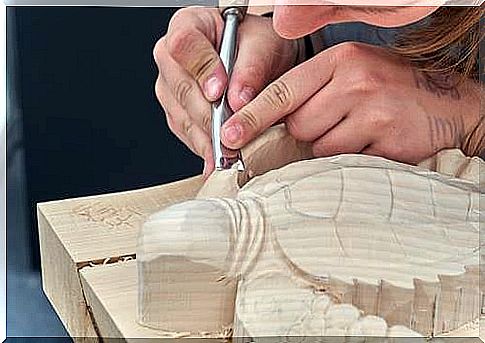Working With The Hands Is Good For The Brain

Touching, feeling, shaping, knitting, tidying the garden and painting alle .all these manual activities are really good for your brain. Not only are they fun, they actually form endorphins, which reduce stress and anxiety. You can get a lot out of working with your hands.
Working with your hands is one way to improve your mental health. Shaping clay, knitting, shaping, making sculptures, sewing, tidying the garden and painting are among the activities that are excellent for stimulating the brain. It is also a good way to reduce stress and improve the plasticity of the brain. Then you train your abilities, concentration ability, and your inner peace.
The connection between hands and brain is essential for humans. It creates a positive feedback spiral that can really develop you. That is why it is so important for children to train the manual skills and fine motor skills as it is healthy for their brain!
But we all know that when we grow up and do not have much time, we forget the beauty of manual activities. Unless it’s part of your job, you’re probably not doing it. In fact, things like phones and computers have made people write less and less by hand.
Although many people know the benefits of exercising, very few people think about their hands when they do. They are extremely versatile and mobile, and have a huge creative potential. When you actively use your hands for a type of manual work, you can also improve your mood. Let’s take a closer look at this.

Creativity and mental health
It is probably no exaggeration to say that our society has reached a point where manual labor is losing its value. Office jobs, think tanks, marketing, advertising, engineering, finance, technology companies… These are all careers where other abilities are favored, especially the intellectual ones.
But there are also important jobs, such as construction work, agriculture, auto mechanic, plumbing and electrician, that require a few skilled hands. They solve problems for the rest of us and ensure that we can have a good quality of life. What we are trying to say is that both intellectual and manual jobs are important to our daily lives.
It is also worth pointing out that an exciting perspective on this is beginning to open up in neuropsychology. We need to do away with the modern tendency to put intellectual work over manual work. In fact, it would go against our very nature if one removed this by working with the hands.
It can also be extremely healthy for you. The neurologist, Kelly Lambert of Richmond University, argues that performing manual tasks can even reduce the risk of depression.
Work with your hands and mental health
The manufacture of tools has enabled man to become what we are today. The cooperation between the eye, the hand and the brain is a perfect intellectual and emotional “alliance” that does many good things. So why do we overlook this important part of our lives?
- If you sit at your computer all day, it does not count as working with your hands. Cleaning a drain does not count either. We are talking about something that is much deeper, something that requires you to use your neural connections, and boost the plasticity of the brain.
- How do you do it? By creating and changing. You should engage in some process that will end up with a satisfactory result. It can be anything from sculptures, shaping clay, sewing, drawing or just planting a flower can have a big, positive impact on your emotional life.
Kelly Lambert says basically the same thing in her book Lifting Depression: A Neuroscientist’s Hand-On Approach to Activating Your Brain’s Healing Power. The goal is to find manual tasks that activate your brain’s reward center. It happens through a mental effort, concentration and the pleasure you get out of the task.

Effort, creation and satisfaction. Neurochemistry that fights depression
To make it very clear: just learning to shape clay, make sculptures or knit will not make your depression go away. Working with your hands is simply a catalyst and a way to change the chemistry of your brain. It is a starting point that can take you to a good place.
Combined with other things, such as therapy, it can really make a huge difference. But let’s take a closer look at what exactly it can do for your brain to work with your hands:
- It changes the physiology of your brain and its chemical reactions. When you do manual tasks, serotonin and endorphins are released, and your cortisol, which is called the “stress hormone”, is lowered.
- Manual tasks can also strengthen the plasticity of the brain by forming new connections between the neurons. That way, you keep your brain young and fresh longer.
- As Robin Hurley of Baylor University has explained, manual activities that are important to patients (playing an instrument, painting, etc.) can even relieve the symptoms of chronic stress. This is important because it means they become more receptive and relaxed when dealing with their depression.
How do you want to work with your hands?
Before we finish, we just want to have another thing in place. Not all manual tasks are beneficial. For example, if you work in a factory, you will not benefit from the repeated movements. The key is to find something that will pique your curiosity, passion and interest.
Find a manual activity that satisfies you, challenges you and also makes you relaxed. Try to find the “flow” that psychologist Mihaly Csikszentmihaly has talked so much about.
It is the state of mind where the world stands still and you are completely in touch with yourself, completely engrossed in the creative process. There is not much that is as satisfying as that.









